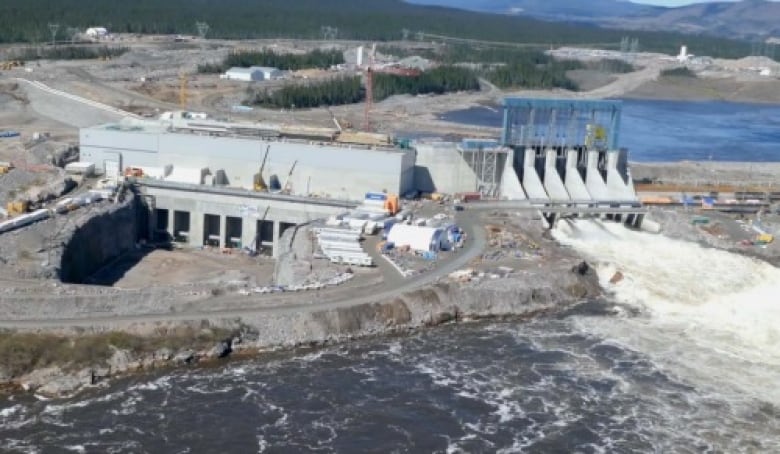Natural gas option 'unfairly ' dismissed in lead-up to Muskrat Falls, engineer tells inquiry
More tension at inquiry as lawyers take exception to testimony of Stephen Bruneau
An option for Newfoundland and Labrador's electricity needs that was quickly dismissed in the lead-up to sanctioning of Muskrat Falls dominated discussion at a public inquiry in St. John's Friday.
That dismissal led to some tension that resulted in the testimony of Memorial University engineering professor Stephen Bruneau being cut short, with cross-examination delayed until lawyers have more time to consider some of the harsh criticism he levelled at those reviewing the options.
"Counsel has some very serious concerns about the way this witness has been presented," Tommy Williams, the brother of — and lawyer for — former premier Danny Williams, told commissioner Richard LeBlanc.
A pipeline from the offshore
Bruneau inserted himself into debate over Muskrat Falls in early 2012, when he gave a presentation about the potential of natural gas from the Grand Banks.
Bruneau floated the concept of building a pipeline from the petroleum-producing platforms in the offshore to Newfoundland, and using natural gas to replace oil-fired generation at Holyrood.

He took the initiative to study the possibility after Nalcor eliminated the option, saying it was not viable.
Bruneau believed that finding was "merely an opinion" and was not supported on the basis of any evidence.
Appearing before the inquiry Friday, Bruneau brought 17 pages of notes, including point-by-point criticisms of a Ziff Energy report that upheld Nalcor's earlier findings on the natural gas option.
It was these notes — and Bruneau's testimony — that got the attention of Williams and other lawyers.
"We were handed these five minutes before he took the stand," said Williams.
"[Bruneau's] report takes some very strong issues and raises some very strong arguments for which no counsel has had an opportunity to sit down and review."
Commissioner Richard LeBlanc agreed with Williams, and advised Bruneau that he will be called back before the inquiry at a later date to undergo cross-examination.
'Unpatriotic and unhelpful'
The unexpected twist followed nearly two-and-a-half hours of testimony by Bruneau, during which he repeated his belief that the natural gas option should have received greater scrutiny.
"Contrary to some claims in the media, natural gas was available within the timeframe of our domestic electric needs, for for the duration of our needs and in the quantities we needed for domestic island electricity."
The 2012 presentation garnered a lot of attention as the debate over Muskrat Falls was raging, and critics of the so-called interconnected island option were being labelled "unpatriotic and unhelpful," as Bruneau put it Friday.
Bruneau said he worried about presenting an opposing view, and when asked by inquiry co-counsel Barry Learmonth whether he was concerned about hurting his career, he replied: "Well you better believe it."
Not long after Bruneau's 2012 presentation, Nalcor commissioned Ziff to review the natural gas option.
Once again, the concept was dismissed.
It is an indisputable fact that the quantity of natural gas required to fuel the domestic needs right now are being actively stored offshore.- Stephen Bruneau
But Bruneau believes otherwise.
"It is an indisputable fact that the quantity of natural gas required to fuel the domestic needs right now are being actively stored offshore," Bruneau said.
Billions cheaper
He added that "more natural gas is used to generate electricity for Hibernia, Terra Nova and the SeaRose platforms than is needed to replace Holyrood."
He added: "In many instances, the production of oil on our platforms offshore is bottlenecked by the amount of gas that they get."

Bruneau estimated six years ago that the cost of building a pipeline and related infrastructure for natural gas would be $2 billion, far lower than the $6.2 billion price tag for Muskrat Falls when it was sanctioned in late 2012.
We in the province could afford to pay for the key infrastructure ourselves and still pay the producers for supplying us billions cheaper than the alternative.- Stephen Bruneau
"We in the province could afford to pay for the key infrastructure ourselves and still pay the producers for supplying us billions cheaper than the alternative," he told the inquiry.
Construction cost for Muskrat Falls have since ballooned to $10.1 billion, with an all-in cost of nearly $13 billion when financing costs are factored in.
"My arguments were around the economics to go with it in the first place," Bruneau said of Muskrat Falls.